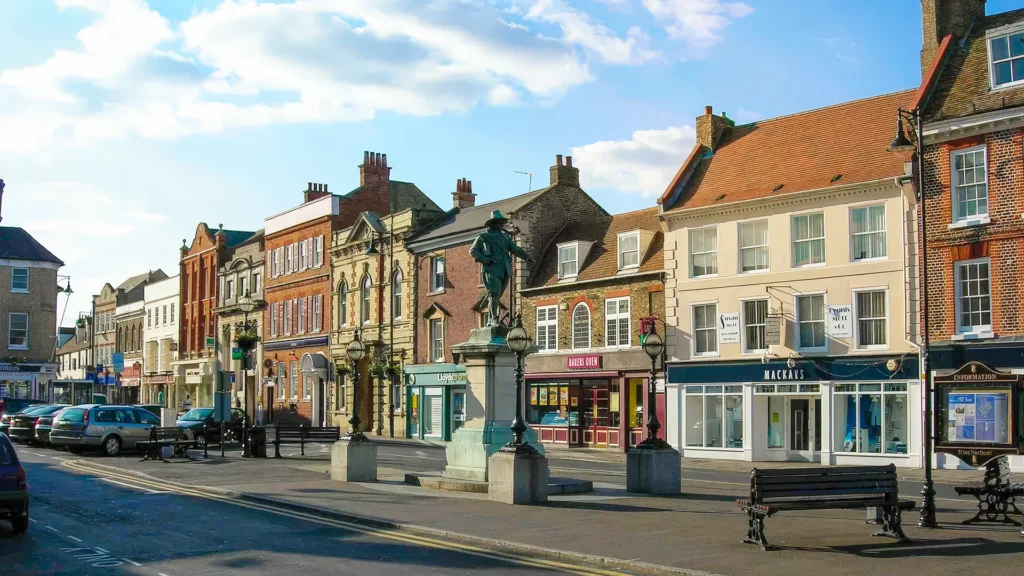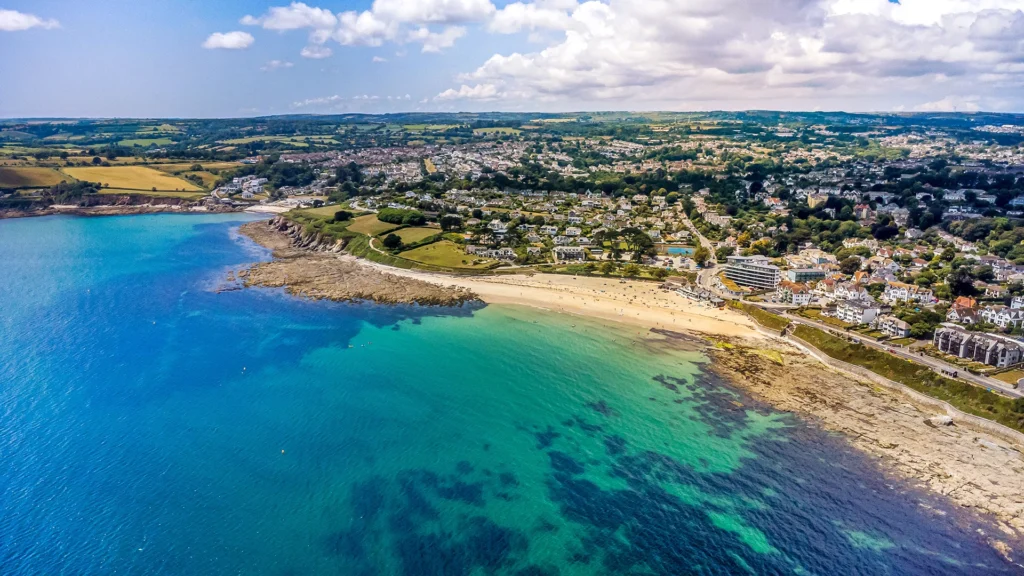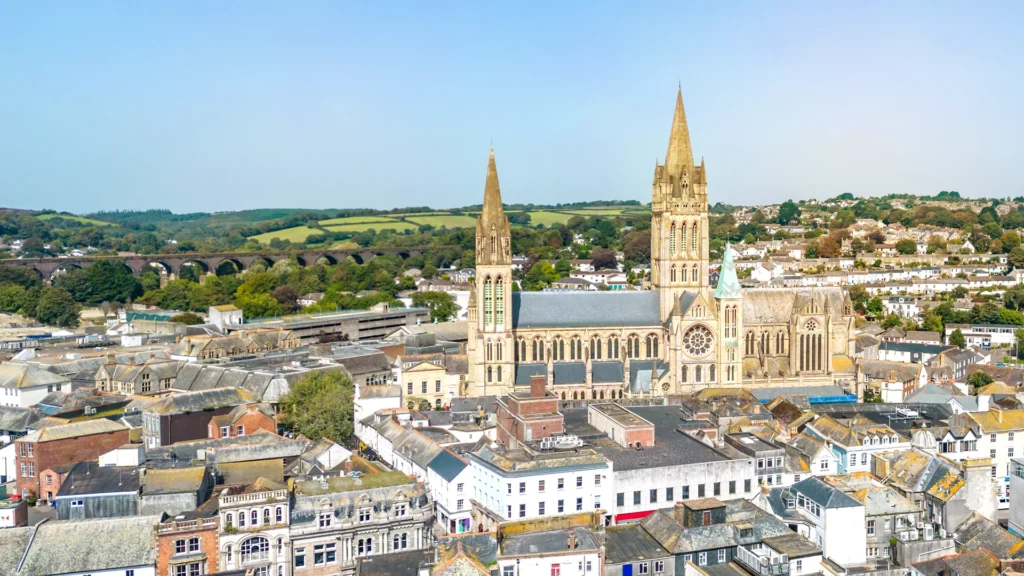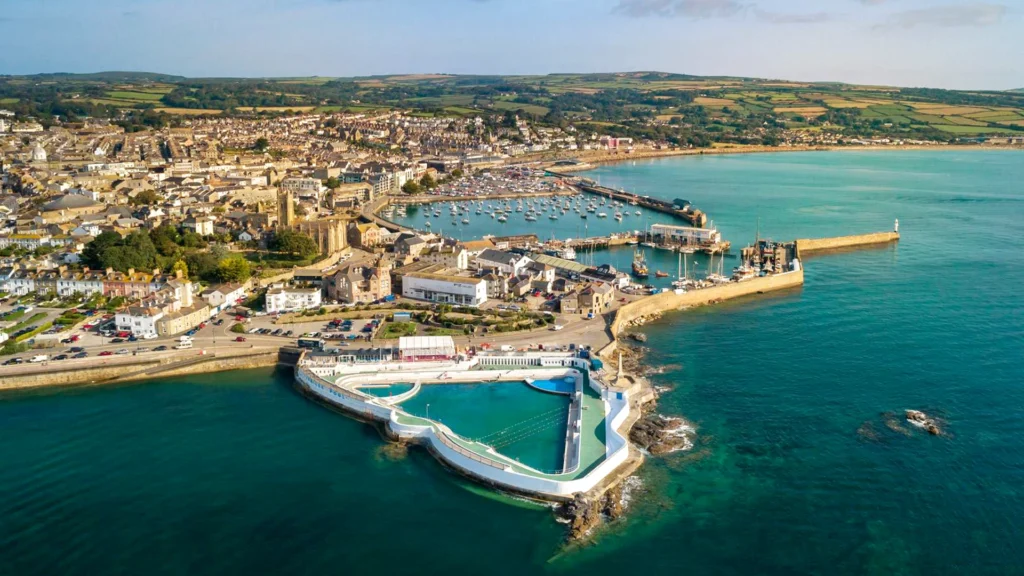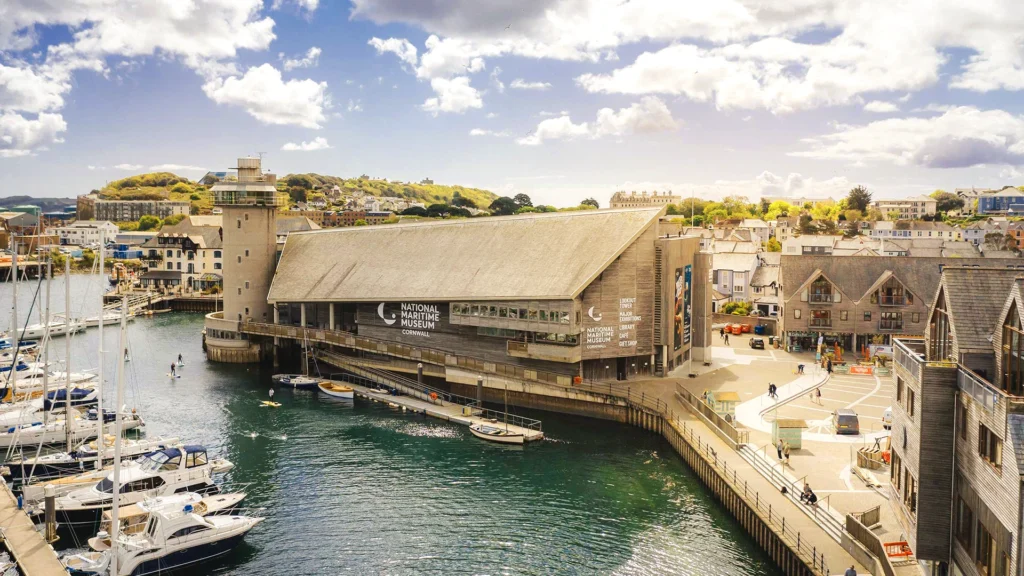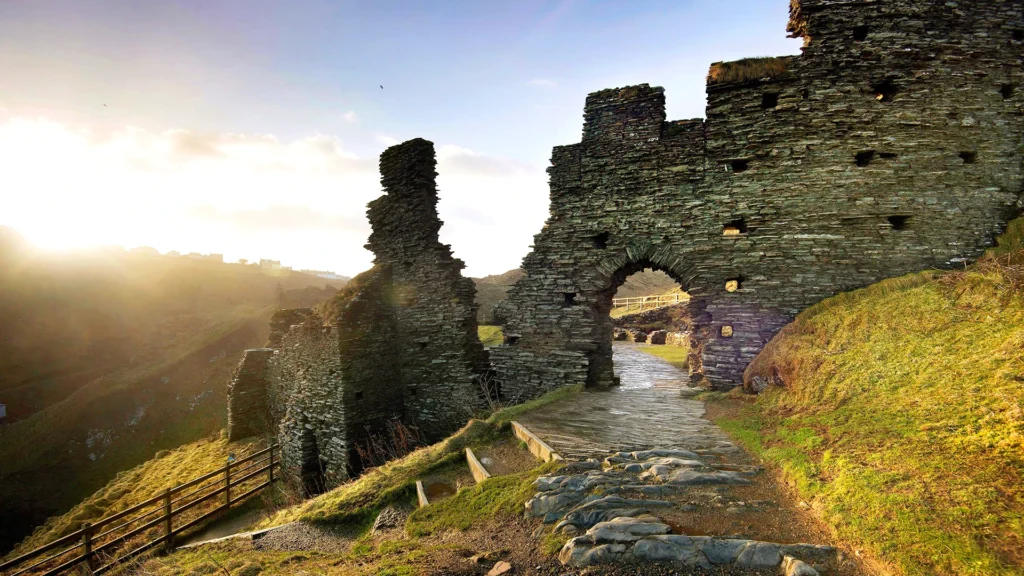Cornwall, the jewel of England’s southwest, is more than just a holiday hotspot—it’s a dream location for those seeking a new home. With its breath-taking coastline, charming villages, and a pace of life that’s refreshingly laid back, Cornwall attracts people from all walks of life.
Cornwall is a county in southwest England with a population of 570,300. It has an ageing population (over 25% are 65+), low ethnic diversity (96.8% White), and a strong Cornish identity – 13.8% identify as Cornish. The economy is driven by tourism, agriculture, fishing, and emerging sectors like renewable energy, aerospace (Spaceport Cornwall), and digital industries. Wages are lower than the national average, but unemployment is also low. Cornwall has seen infrastructure improvements, including A30 road upgrades, broadband expansion, and upcoming rail improvements (Mid Cornwall Metro).
Imagine waking up to the sound of waves crashing, enjoying miles of golden beaches, and immersing yourself in a lifestyle that feels like a permanent retreat. Cornwall offers all that and more. There’s a place for everyone, from artistic communities to maritime towns steeped in history. If you are looking to sell your house fast in Cornwall, Zapperty is here to help!
In this guide, we’ll take you through some of the best places to live in Cornwall. We’ll explore what makes each area special and highlight the activities and amenities that make Cornwall so desirable. Whether moving for a fresh start, retiring, or seeking a family-friendly environment, this guide will help you find your perfect spot in Cornwall.
Attractions & Amenities
Cornwall is famous for its breathtaking scenery and cultural sites. Whether you want to relax on a golden beach, visit ancient castles, or explore world-renowned art galleries, there’s plenty to see and do.
- Natural Landmarks: Land’s End, Lizard Point, Bodmin Moor, Kynance Cove, and the stunning South West Coast Path.
- Historic Sites: Tintagel Castle (linked to King Arthur), St. Michael’s Mount, and Cornwall’s tin mining heritage.
- Cultural Attractions: The Minack Theatre (open-air clifftop theatre), Tate St Ives (modern art gallery), and the Eden Project (world’s largest indoor rainforest).
- Outdoor Activities: Surfing in Newquay, sailing in Falmouth, cycling on the Camel Trail, and hiking along the coast.
- Shopping & Dining: Boutique shops, art galleries, and some of the best seafood restaurants in the UK.
Transportation
While Cornwall is rural, its transport network is improving, making it easier to get around. Public transit is limited in some areas, but investments in buses, rail, and road infrastructure are making a difference.
- Public Transit: Improved bus network (Transport for Cornwall) with capped fares (£5/day for unlimited travel).
- Road Network: The A30 is the main highway, with ongoing improvements to ease congestion.
- Airports: Cornwall Airport Newquay offers flights to London, Manchester, Edinburgh, and European destinations.
- Cycling & Walking: Off-road trails like the Camel Trail and Saints Trails provide scenic routes.
Housing Market
Housing demand in Cornwall is high, driven by second-home buyers, retirees, and people relocating from cities. This has led to rising property prices, making affordability a challenge for local workers.
- Average house price: ~£300,000 (9 times median salary).
- Rentals: Average rent is ~£940/month, but availability is low due to second homes and holiday lets.
- Hotspots: St Ives, Padstow, and Fowey are expensive. Truro, Falmouth, and Newquay are good for young professionals, while Camborne, Redruth, and St Austell are more affordable.
Ideal For
Cornwall attracts different groups of people, from surfers and artists to families and retirees.
- Young Professionals: Ideal for remote workers and those in tourism, tech, or creative fields, but job opportunities are limited.
- Families: Safe environment, great schools, and plenty of outdoor activities, but fewer urban amenities.
- Students: Falmouth University offers an arts-focused student experience in a small but vibrant community.
- Retirees: A top choice for peaceful coastal living, community spirit, and a mild climate.
Crime Rates
Cornwall is one of the safest areas in the UK, with very low levels of violent crime. Most incidents involve minor theft, anti-social behavior, or petty vandalism, and rural areas experience minimal crime. Devon & Cornwall’s crime rate was about 55 crimes per 1,000 population in recent data, versus an England/Wales average of ~80 per 1,000.
- Crime rate is among the lowest in England & Wales.
- Newquay and Camborne-Redruth see slightly higher crime levels, but still low by national standards.
Cost of Living
Cornwall’s housing market is one of the least affordable in the UK, with property prices outpacing local wages. The county’s desirability for second homes and holiday rentals has driven prices 9 times higher than the median salary, making it difficult for locals to get on the property ladder.
- Average House Price (2024): £300,000, compared to the UK average of £285,000.
- Hotspots: St Ives, Padstow, Rock, and Fowey, where properties often exceed £500,000–£1M+.
- More Affordable Towns: Camborne, Redruth, St Austell – homes under £250,000 are still available.
- Rental Costs: Average rent is £940 per month, but in prime locations like Falmouth or Newquay, £1,200+ is common for a two-bedroom home.
For those moving from major cities like London or Bristol, Cornwall may still seem relatively affordable. However, for locals earning £25,000–£30,000 per year, finding housing remains a challenge. Many families are now looking further inland for affordable homes, away from the picturesque but expensive coastlines.
Job Opportunities
Cornwall’s job market has low unemployment (2.5–3%), but wages are lower than the UK average. Employment is seasonal in many industries, making year-round stability harder to find.
- Tourism & Hospitality: Hotels, restaurants, and seasonal work.
- Agriculture & Food Production: Dairy, fishing, and Cornish pasty production.
- Public Sector: NHS, education, and Cornwall Council are among the largest employers.
- Tech, Aerospace & Renewables: Spaceport Cornwall, lithium mining, and marine engineering are growing sectors.
- Self-Employment & Small Businesses: Many people run their own businesses, from B&Bs to artisan crafts.
Lifestyle & Entertainment
Cornwall offers a relaxed yet vibrant lifestyle, with year-round festivals, outdoor activities, and a strong creative scene.
- Nightlife: Newquay (bars, clubs), Falmouth (student scene), Truro (cocktail bars), but nightlife is quieter than cities.
- Festivals: Boardmasters (surf & music), St Piran’s Day, Obby Oss, Flora Day, and maritime events.
- Outdoor Recreation: Surfing, sailing, hiking, gig rowing, and rugby (Cornish Pirates team).
- Arts & Culture: Tate St Ives, Minack Theatre, and Hall for Cornwall host exhibitions, performances, and live music.
Community & Demographics
Cornwall has a strong sense of local identity, community spirit, and a mix of lifelong residents and newcomers.
- Cornish pride is strong, with traditions, dialect, and the St Piran’s flag visible everywhere.
- Older population (median age ~48), with an influx of retirees.
- Tight-knit villages and towns, where people know their neighbors and support each other.
- Growing, but still limited, diversity, with some migration from Europe and the rest of the UK.
Best Places to Live in Cornwall
Cornwall is a diverse county with a wide range of towns and villages, each offering its own unique lifestyle.
Below are some of the standout places to consider:
1. St Ives: Artistic Community and Stunning Beaches
St Ives is a haven for creativity, blending coastal charm with a buzzing artistic scene. Known for its golden beaches, quaint streets, and inspiring landscapes, it’s no surprise that St Ives is a favourite for artists and nature lovers alike.
- Why It’s Special:
St Ives is home to the Tate St Ives, a world-renowned art gallery that celebrates the town’s artistic heritage. The Barbara Hepworth Museum and Sculpture Garden further highlight its creative roots. The beaches—like Porthminster and Porthmeor—are ideal for surfing, swimming, or simply soaking up the sun. - Who It’s For:
Perfect for retirees, creatives, or anyone seeking a slower pace of life with a touch of culture and stunning scenery.
2. Falmouth: Vibrant Maritime Town with a Rich History
Falmouth is a lively town with a rich maritime heritage. Its natural harbor—one of the deepest in the world—has shaped its history and continues to influence its culture today.
- Why It’s Special:
Falmouth is a hub for foodies, families, and history buffs. The National Maritime Museum Cornwall offers a deep dive into the area’s seafaring past, while Pendennis Castle stands as a reminder of its strategic importance. Falmouth is also a university town, bringing a youthful energy to its streets. - Who It’s For:
Ideal for families, professionals, and anyone who loves a blend of history, culture, and a vibrant atmosphere.
3. Truro: The County’s Capital with Excellent Amenities
Truro is Cornwall’s only city, offering a bustling hub for shopping, dining, and entertainment while maintaining its small-town charm.
- Why It’s Special:
Known for its stunning Georgian architecture and iconic cathedral, Truro also offers excellent healthcare, schools, and transport links. The city hosts regular farmers’ markets, bringing fresh local produce to its residents. - Who It’s For:
Families, professionals, and those who want the convenience of city living without losing the community spirit Cornwall is famous for.
4. Penzance: A Blend of History and Coastal Charm
In Penzance, you’ll find history, culture, and dramatic coastal beauty. Situated in Cornwall’s far west, it’s a gateway to the Isles of Scilly and boasts a unique charm.
- Why It’s Special:
Penzance offers attractions like the Jubilee Pool—a beautiful art deco lido—and St Michael’s Mount, a tidal island steeped in history. Its creative vibe and relaxed atmosphere make it a magnet for people looking for something a little different. - Who It’s For:
Adventurers, history lovers, and anyone drawn to Cornwall’s rugged beauty and cultural vibrancy.
Things to Do in Cornwall
Once you’ve found your perfect home in Cornwall, there’s no shortage of activities to enjoy:
Outdoor Activities and Attractions
- Beaches and Coastal Walks:
With over 300 miles of coastline, Cornwall is a paradise for beachgoers and walkers. Explore hidden coves, sandy stretches, or take in the stunning views along the South West Coast Path. - Surfing and Water Sports:
Towns like Newquay and Polzeath are famous for their waves, making Cornwall a global surfing destination.
Cultural and Historical Sites
- Museums and Galleries:
Discover Cornwall’s history and artistic heritage at venues like the Tate St Ives or the Royal Cornwall Museum in Truro.
- Historic Landmarks and Castles:
Explore Tintagel Castle, said to be the birthplace of King Arthur, or the Eden Project with its iconic biomes.
Family-Friendly Activities
- Theme Parks and Adventure Parks:
Flambards Theme Park and Camel Creek Adventure Park are perfect for family days out. - Educational Experiences:
The Blue Reef Aquarium in Newquay or the Lost Gardens of Heligan offer fun and learning for all ages.
Activities in Cornwall During Rainy Days
Cornwall’s beauty isn’t diminished by the weather. Here’s how to enjoy a rainy day:
- Indoor Attractions and Activities:
Visit aquariums like the National Lobster Hatchery or explore art galleries and craft workshops. - Family Fun:
Soft play centers, bowling alleys, and wildlife sanctuaries provide indoor fun for children. - Indulgent Relaxation:
Treat yourself to a cozy afternoon tea or a spa day at one of Cornwall’s luxurious retreats.
FAQs About Cornwall
Is Cornwall worth visiting?
Yes! Cornwall is one of the UK’s top holiday destinations, offering stunning beaches, dramatic cliffs, and charming fishing villages. With world-class surfing, historic castles, and scenic coastal walks, it’s perfect for nature lovers, adventurers, and foodies alike.
What’s special about Cornwall?
Cornwall’s rugged coastline, rich Celtic heritage, and laid-back lifestyle make it unique. It’s home to legendary sites like Tintagel Castle, the iconic Cornish pasty, and one of the best surf scenes in Europe. Its mild climate and breathtaking landscapes attract millions every year.
Why do tourists go to Cornwall?
Visitors come for its golden beaches, turquoise waters, and unique attractions like St Michael’s Mount and the Eden Project. Outdoor lovers enjoy hiking the South West Coast Path, surfing in Newquay, and exploring historic tin mines, while food lovers indulge in fresh seafood and cream teas.
Why do people move to Cornwall?
Many move to Cornwall for its peaceful lifestyle, strong community spirit, and stunning scenery. It’s popular with retirees, remote workers, and families looking for a slower pace of life, fresh sea air, and a closer connection to nature.
Is Cornwall cheap or expensive?
Cornwall has high housing costs (average house price £300,000) but day-to-day living is affordable. Groceries, dining out, and entertainment are reasonably priced, and public transport is cheap (£5 unlimited daily bus travel). However, owning a car is often necessary.
What are the advantages of living in Cornwall?
Cornwall offers a safe, friendly environment with a fantastic outdoor lifestyle. Residents enjoy clean air, stunning coastlines, and fresh local food. The low crime rate, mild climate, and strong local traditions make it an ideal place for families and retirees.
Is it worth staying in Cornwall?
Yes, if you enjoy coastal living, a slower pace, and a close-knit community. It’s great for nature lovers and those working remotely, but job opportunities can be limited. The beautiful surroundings and relaxed lifestyle make it an amazing place to live.
What is Cornwall famous for?
Cornwall is known for its beaches, surfing, and breathtaking landscapes, as well as its rich history and culture. Highlights include King Arthur’s Tintagel Castle, Cornish pasties, the Eden Project, the Minack Theatre, and fishing villages like St Ives and Padstow.
What is the crime rate in Cornwall?
Cornwall is one of the safest places in the UK, with a low crime rate of 55 crimes per 1,000 residents. Most incidents involve petty theft or anti-social behavior in tourist areas, while rural communities remain extremely safe.
Conclusion
Cornwall is more than just a place to live, it’s a lifestyle. Whether it’s the artistic streets of St Ives, the maritime charm of Falmouth, the vibrant heart of Truro, or the historical allure of Penzance, there’s a perfect spot for everyone.
From golden beaches to historic castles, family-friendly attractions to indoor retreats for rainy days, Cornwall offers a quality of life that’s hard to match.
Whether you’re drawn to its natural beauty, vibrant communities, or cultural heritage, Cornwall promises a fulfilling and enriching life. So, why wait? Start exploring your options and find your perfect place to live in Cornwall today. Ready to sell your current property and move to Cornwall? Visit Zapperty to Sell your house now.

